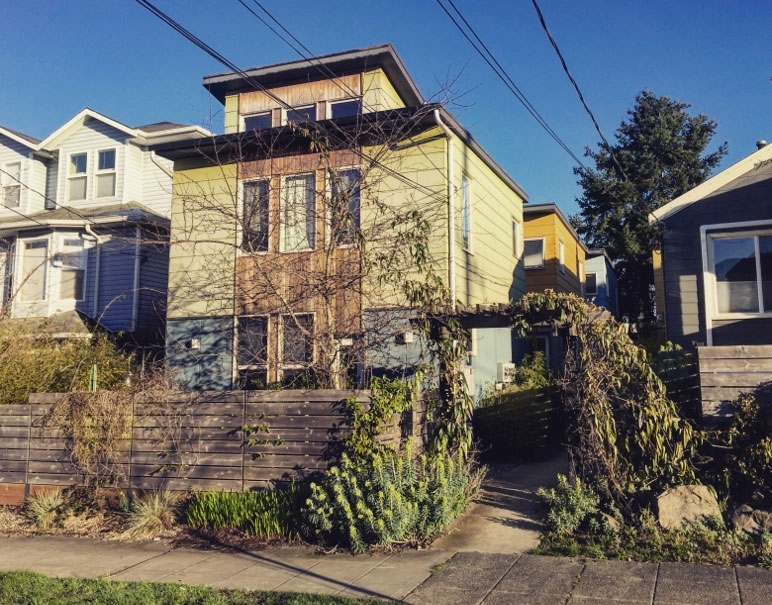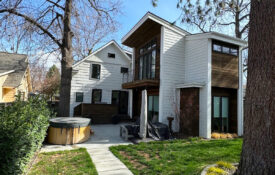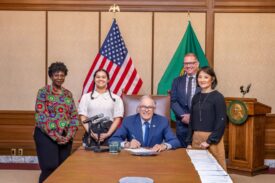UPDATE 3/28/23: The Senate Local Government Committee declined to bring HB 1245 to a vote, thereby killing it.
UPDATE 3/1/23: The House voted 94 -2 to pass HB 1245. The bill was amended to legalize lot splits down to 2,000 square feet, up from 1,500 square feet in the original bill. Previously, HB 1245 and its Senate companion (SB 5364) were both passed out of their policy committees on unanimous bipartisan votes.
A severe lack of modestly priced “starter homes” is shutting out more and more Washingtonians from homeownership. As the New York Times observed, “nationwide, the small detached house has all but vanished from new construction.”
One of the main reasons is no mystery: zoning laws that require every house to have a large lot. When there’s a shortage of homes, land prices go up, which makes it financially infeasible to build anything but a big, expensive house if it has to occupy a big, expensive piece of land. And in a double-whammy, large lot requirements themselves restrict the supply of homes, unleashing a vicious cycle of spiraling prices.
The solution couldn’t be any more obvious: legalize smaller house lots. And that’s what Washington bill HB 1245 (and its companion SB 5364) would do.
And it would do so in an incremental, locally controlled way, by allowing homeowners to split their lots into smaller parcels—if they want to. HB 1245 is not a mandated blanket rezone for smaller lots. Small house lots would be created only when the owner of a lot decides to split it.
What WASHINGTON’s HB 1245 would do
HB 1245 is simple. It grants owners the authority to split their house lot once, into two pieces. For size, each piece can’t be less than 1,500 square feet and can’t be less than 40 percent of the size of the original lot. These lower size limits are intended to keep adjacent lots from becoming too dissimilar. They supersede local minimum lot size requirements.
As a tenant protection measure, the bill prohibits lot splits that would involve demolition of any housing that is rent-restricted or rent-subsidized, or that has been occupied by a tenant paying market-rate rent within the preceding 12 months.
Because it can be difficult to fit parking on small lots, the bill caps parking mandates at one off-street space per split lot. It also establishes a few guardrails for design standards.
Lessons from California’s lot splitting bill: Gradual uptake
Washington’s HB 1245 was modeled after the 2021 California’s SB 9 that legalized lot splits on all single-family parcels statewide. California went smaller on lot size, though, allowing splits down to 1,200 square feet. SB 9 also legalized duplexes on every lot, so in combination with lot splitting, every house lot in California now has the potential to hold four homes.
A new study on SB 9 demonstrates the incremental, gentle rate of change we can expect if Washington legalizes lot splitting by passing HB 1245. A year after California’s law went into effect, the study finds, “some of the state’s largest cities reported that they have received just a handful of applications for either lot splits or new units, while other cities reported none.”
It’s too soon to nail down why uptake has been so low, but one theory is that in some places California’s liberal accessory dwelling unit (ADU) laws make backyard cottages a more attractive option than splitting a lot to add a new house.
The benefits of lot splitting: From starter homes to community stability
Allowing lot splitting would provide a second major benefit aside from the starter homes discussed above. It would create options for homeowners who want to downsize but also stay in their neighborhoods and communities.
Some owners may not want a big backyard and would prefer to see another family living in a house there. Others may want to build a smaller house for themselves on a split lot and sell the original main house to a larger family that needs more space. Others may opt to split their lot to create a home for extended family to live next door. Owners on fixed incomes who are house-rich but cash-poor could sell part of their land to give themselves a financial cushion.
In light of the ownership opportunities and owner flexibility offered by lot splitting, the Black Home Initiative, a new regional effort that targets the racial inequities at the core of the housing ecosystem in an effort to increase homeownership among Black households, has made HB 1245 one of its legislative priorities. Read more about its reasons in this policy brief.
To summarize, legalizing lot splitting:
- Creates more homes, and less expensive homes
- Increases homeownership opportunities at lower price points
- Generates starter homes to get people on the ladder of intergenerational wealth-building
- Increases housing options for families with children
- Creates lower-priced options in neighborhoods with good schools, parks, and amenities
- Enables infill home-building that’s locally controlled, incremental, and low-impact
- Gives cash-poor, house-rich owners a way to stay in their homes and communities
- Creates options for multigenerational households to live next door to each other
- Reduces demolition of modest houses to make way for McMansions
- Enables fee-simple ownership and standard mortgage financing, unlike the more complicated process of selling a backyard cottage through a condo agreement
What Washington currently has on the books regarding lot splitting is, effectively, a government mandate for one luxury house per lot. What HB 1245 would deliver, in a nutshell, is the option for two smaller, less expensive houses on a lot, if an owner wishes. That means more starter homes or options to downsize or host loved ones nearby or increase one’s financial security.
In short, these bills to legalize lot splitting are one piece of the solutions puzzle to address the state’s massive housing shortage—and open the doors for a diverse mix of Washingtonians in all types of communities to find the right home for them.









Steve Erickson
The only problem I saw in reviewing these bills regarded allowing rear lot setbacks to be as little as 4 feet. There needs to be language added assuring sufficient access for emergency services.
~Steve, Whidbey Environmental Action Network
BK
This is a great idea. Here’s the testimony I submitted on the bill:
I am testifying in support of this bill as the happy owner of a split-lot infill house in Seattle.
The original house was on a 4,000 square feet of land and remains on 1,500. Ours is on 2,500.
This was only possible because of limited rules for streets with legacy small lots on them. I believe it is vital to allow lot splitting like this everywhere.
We are a tech family. There was no question we could afford the house we wanted–but we did not want a big yard. So first: please appreciate the perversity of lot size rules that might mandate people like us fill up more land near jobs and transit that we don’t even want.
Second: the little old house might have been torn down. Instead, it was renovated. More work for trades people, less waste in the landfill, and a smaller less expensive house was preserved.
Third: our house is big–three stories of 1,000 square feet. Under Seattle’s new ADU rules, one like it could be three family sized stacked flats. That would be great for more affordable access to our high opportunity, formerly redlined neighborhood.
Lot splitting is pro-inclusion, anti-displacement, and pro-environment. Please give elder or BIPOC homeowners the power to age in place securely by selling part of their lot to families like ours. Or to give part of their lot to their kids. Or to downsize into multi-generational housing, perhaps paid for by selling the main house.
Forcing large lots on people whether they want or can afford them works against folks with less and needlessly pits them against those with more for homes near jobs and transit. This bill would change things so much for the better–we’re a little bit of living proof. Please vote yes. Thank you.
Morgan
We ‘trades people’ in the region don’t need any more work. We’re raising our rates like crazy. More people entering the trades is what we need, just as we need more technology workers across the country to ease the core problem–income inequality.
I don’t recall anything about lot splitting been much of an ecological positive, as it’s increasing the proportion of impervious surface, while eliminating urban habitat, which is critical to successful, happy human lives in the city.
Eric
Yes, we need to build homes faster, and tradespeople have had no shortage of work lately, so we do obviously need more people in trades so that more homes can be built. A track record of high and increasing wages certainly should help convince people to pursue these careers!
Regarding impervious surfaces, yes new homes are less pervious than a grass lawn. But! Squeezing new homes into an existing neighborhood that has already been largely paved over with streets and sidewalks is much better than adding new neighborhoods elsewhere. Unless adding new housing is off the table entirely (which it shouldn’t be!), infill is better for runoff than building out.
Michael H Wilson
Is anything being done to open the market to boarding houses? From what I understand there were quite a few in the region, then most of the were outlawed. With a society that is growing older there might be a need for them in the future.
Robin Luethe
Res stacked flats, we need a lot of 3 bedroom 1200 sq ft 3 story walkups. 1 1/2 bath houses. This is bigger than many of us grew up in the the 40s and 50s almost a hundred years ago/1
BK
All in on more stacked flats, classic more affordable housing…I grew up in 2-3 bedroom 1,000 sq ft 1 bath apartments….1,200 and an extra half bath would have been posh indeed! 🙂